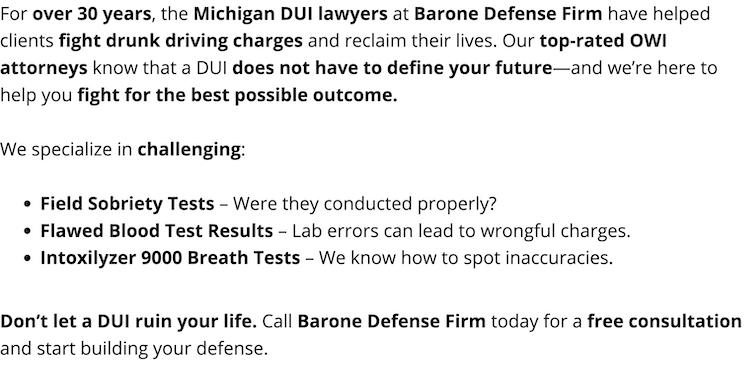DUI Fleeing and Eluding Charges
Michigan DUI lawyers are sometimes faced with over-zealous prosecutors who want to pile on to the drunk driving charge. One way to do this is to add an additional "count" (charge) of Fleeing and Eluding. Fleeing and Eluding in the 4th Degree is a 2 Year Felony and the "count" most commonly added to a Charging Complaint.
As some Michigan DUI lawyers know, the reason that adding Fleeing and Eluding to a Michigan drunk driving charge is so significant is because this additional crime is classified as a Felony, whereas most Michigan drunk driving charges are misdemeanors.
Legal Definition of Fleeing and Eluding
If you are charged with this crime, or if you are a DUI lawyer trying to help a client so charged, then it is important to understand the differences and similarities of Fleeing and Eluding under the Michigan Motor Vehicle Code(MMVC)[1], and Fleeing and Eluding under the Michigan Penal Code(MPC)[2].
The two codes, also called "statutes" are essentially identical in their statutory construction and how they are prosecuted. Further, the license sanctions are also identical. However, the monetary penalties and how the matter is potentially resolved are very different.
For example, as shown below, there is a significant difference in the fine that may be imposed under the two statutes.
MMVC MPC
257.602a v 750.479a
*4th Degree 2 yrs/ $500 2 yrs/ $2,000
3rd Degree 5 yrs/ $1,000 5 yrs/ $5,000
2nd Degree 10 yrs/ $5,000 10 yrs/ $10,000
1st Degree 15 yrs/ $10,000 15 yrs/ $15,000
Differences
The most significant difference between the two charges/codes is that if the charge is brought under MPC, then the prosecutor has the ability to amend or reduce the charge to ATTEMPTED Fleeing and Eluding, which would allow the conviction to be a Misdemeanor.
In many cases, attorneys seek a plea offer to an Attempted Fleeing and Eluding because they believe it will then be a Misdemeanor, however, that is not always the case. If the Fleeing and Eluding charge is under the Motor Vehicle Code then it CAN NOT be reduced to a Misdemeanor.
The reason this charge cannot be reduced a Misdemeanor as an "Attempt" is because under the MMVC's "Conviction of an ATTEMPT"Statute[3] it requires the Court to impose the same penalties as if the offense were committed. Therefore, a District Court does not have jurisdiction and can not sentence because the penalty requires more than a 1 year jail sentence.
Conversely, under MPC, there is no similar statute that prevents the charge from being reduced to an Attempted Fleeing and Eluding. However, this alternative to a Misdemeanor is only available under 4thDegree . Fleeing and Eluding 3rd – 1st Degree still prohibit the District Court jurisdiction because the penalty would be greater than a 1 year jail sentence. Therefore, only Fleeing and Eluding 4th Degree under the Penal Code may be reduced to a Misdemeanor.
When considering this information, keep in mind that there are many similarities as well so that with a conviction for Fleeing and Eluding under the Motor Vehicle Code, or Attempted Fleeing and Eluding or Fleeing and Eluding under the Penal Code, the Secretary of State will impose an identical 1 year license suspension with no Hardship Appeal, 6 points, and a two-year $1,000 driver responsibility fee. Further, if the conviction is under 1st or 2nd degree, the Secretary of State will impose a 1 year revocation rather than a suspension.
[1] MCL 257.602a
[2] MCL 750.479a
[3] MCL 257.204b
 Barone Defense Firm Home
Barone Defense Firm Home
















